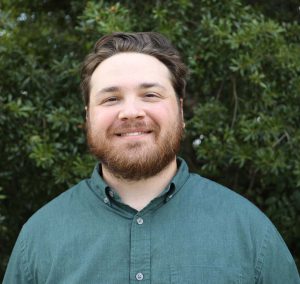Contributor: Katie Ray, UF/IFAS Center for Aquatic and Invasive Plants (CAIP) Intern

Originally from Long Island, Jonathan Glueckert received his undergraduate degree from Siena College in upstate New York where he studied environmental science. After working several seasonal jobs for the forest service in Idaho, Jonathan moved to Florida to work with Dr. Stephen Enloe at the University of Florida Institute of Food and Agricultural Sciences Center for Aquatic and Invasive Plants (UF/IFAS CAIP) as a biologist on an interagency project with Florida Fish and Wildlife (FWC), Southwest Florida Water Management District (SWFMD), and US Fish and Wildlife Service. The agencies came together due to highly invasive Lygodium microphyllum, commonly known as Old World climbing fern.
“They all came together because of Lygodium microphyllum,” Jonathan said, “which is one of the most invasive ferns in Florida.”
Research of the management practices of Old World climbing fern has not been updated in the past decade. This fact sparked the agencies’ desire to research new control technologies and techniques to treat the invasive plant.
“It kind of plateaued, so we’ve been using the same stuff for about ten years.” Jonathan said. “Everybody decided that we needed a new intensive program to figure out some new herbicide technologies.”
After three years of working as a biologist at CAIP, he decided to begin a master’s program at the UF. Jonathan said one of his goals is to work as a land manager for a federal or state agency.
“It’s typically a two-year program, but I also work full time as a biologist,” Jonathan explains. “That’s because of the grant that I originally got from all those agencies, so I transferred that over to a graduate assistantship.”
Majoring in Agronomy, Jonathan has focused his thesis on better management practices for Old World climbing fern. Although the highly invasive plant has been discovered as far north as Jacksonville, Jonathan has discovered it to be most intense in the wetland areas of South Florida.
In a typical day, Jonathan navigates the wetlands of South Florida by airboat, focusing specifically on visiting the habitats of tree islands. Tree islands serve as nesting areas and homes for wading birds and other mammals. These islands are sensitive habitats, often taking thousands of years to form. Old World climbing fern grows up native trees, often causing the collapse of entire tree canopies on these islands.
Through his research, Jonathan has discovered poodle cutting, slicing the invasive plant at chest height, to be the most difficult part of management. After this difficult process the plant can be treated in various ways in order to determine which process works best to reduce plant growth. The fern can only be accessed when water levels are high because of its density. However, the plant can still survive water inundation.
Jonathan said his job is never boring. He spends his days with wild hogs, alligators, killer bees and pythons.
“I just really love having a problem, figuring out, and trying to solve it,” Jonathan says.
As long as his research makes managing invasive plants easier for land managers and contractors, Jonathan would like to continue researching and managing invasive plants in South Florida and beyond. “My current position is a really good mix of research and being out in the field and actually doing work, and I would like to continue doing that,” Jonathan said.
Funding graduate student research students is one of the many goals of UF/IFAS CAIP. Any questions should be directed to Shelby Oesterreicher at 352-273-3667 or soesterreicher@ufl.edu. For more information about the UF/IFAS Center for Aquatic and Invasive Plants please visit https://plants.ifas.ufl.edu. Be sure to follow us on social @UFIFASCAIP.
UF/IFAS CAIP, Turning Science Into Solutions.
 0
0
